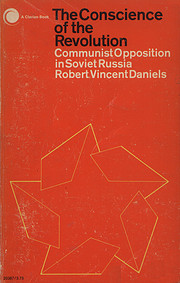

Auf ein Miniaturbild klicken, um zu Google Books zu gelangen.
|
Lädt ... The Conscience of the Revolutionvon Robert Vincent Daniels
 All Things Russia (47) Keine aktuelle Diskussion zu diesem Buch. keine Rezensionen | Rezension hinzufügen
Gehört zu Verlagsreihen
Keine Bibliotheksbeschreibungen gefunden. |
Aktuelle DiskussionenKeine
 Google Books — Lädt ... Google Books — Lädt ...GenresMelvil Decimal System (DDC)324.247Social sciences Political Science The political process Political parties Europe Russia and Eastern EuropeKlassifikation der Library of Congress [LCC] (USA)BewertungDurchschnitt: (4.5) (4.5)
Bist das du?Werde ein LibraryThing-Autor. |
|||||||||||||||||||||||||||||||||||||||||||||||||||||||||||||||||||||||||||||||||||||||||||||||||||||||
I read "The Conscience of the Revolution" some years ago and I remember being impressed by the wealth of detail on many conflicts and disagreements among Russian Communists. Though the writing is somewhat dry and academic (the book actually got its start as Daniels's 1950 Harvard Ph.D. dissertation), it is clearly written and very well-organized, and anyone with an interest in the subject will find it engrossing and far from tedious. Everything is extensively documented, with over 100 pages of appendices, notes, bibliography and index. I was pleased to find that the appendices include early examples of two-dimensional graphical political analyses of the type recently popularized by the "Political Compass" (politicalcompass.org), which plot actors' programs ("mass-interest" vs. "class-interest") on the horizontal axis and methods ("hard" vs. "soft") on the vertical.
Though I imagine some might be inclined to sneer at "The Conscience of the Revolution" as a study of petty factionalism and sectarianism on the left, Daniels argues eloquently that studying the Communist opposition sheds light into both why Stalinism emerged from the October Revolution and that there were other alternatives, even after the Bolsheviks had established their single-party "dictatorship of the proletariat". He describes the basic conflict as that between "Leninist" and "Leftist" communism, the first devoted to power ("revolutionary pragmatism") and the other to principle ("revolutionary idealism") (4). The tension between these two wings "was resolved in the victory of the Leninist current of Communism over the Leftist, the triumph of reality over program" (5). Daniels's goal is to explain this struggle and its results, as well as to rescue the idealists from the obscurity into which they were cast by the triumph of Stalin's will.
My only objection to Daniels's work, not sufficient to justify the removal of a star, is its exclusive focus on opposition from within the Communist Party. For instance, the Kronstadt Revolt of 1921, despite being "the most serious internal political crisis ever faced by the Soviet government" (143), receives a scant three pages. I would have appreciated more information on left-wing opposition outside the party, among anarchists, Mensheviks, left SRs and others, especially in the period before the Bolshevik dictatorship had been consolidated and all external opposition suppressed. But since Daniels's focus is on tensions within Bolshevism itself, the omission of this topic is reasonable, and doesn't significantly detract from a classic study.
Contents:
1. The Formation of the Bolshevik Party
2. The Bolshevik Factions in the Revolution of 1917
3. The Brest-Litovsk Controversy and the Left Communists
4. War Communism and the Centralization Controversies
5. The Trade-Union Controversy
6. The Crisis of 1921
7. Leninism Restored
8. The Interregnum
9. The New Course Controversy
10. The Party after Lenin
11. The Zinoviev Opposition
12. The United Opposition
13. The Right Opposition
14. "Enemies of the People"
15. Why the Opposition Failed (